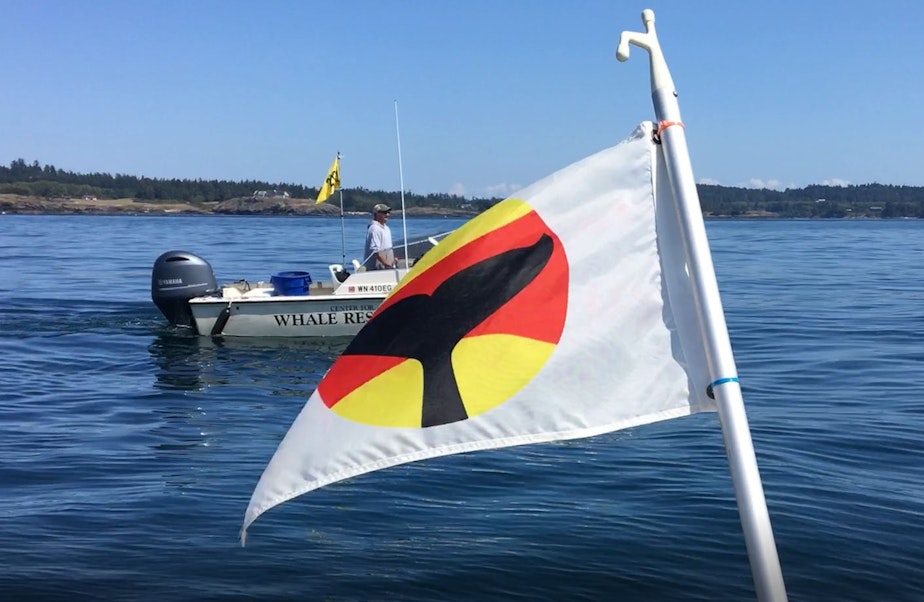Pandemic cabin fever + boat sales = harassed orcas

Off the west side of San Juan Island, Deborah Giles quickly grabbed her boat’s bright yellow research flag and started waving it at a small boat chopping through the waves.
“That's not something that we typically do,” the orca researcher with the University of Washington's Center for Conservation Biology explained. “Trying to flag them down, so that they will just stop because they're heading right toward a group of whales.”
This summer, Giles said, she’s had to flag down boats three or four times a day, every time she heads out to study the region’s endangered southern resident orcas.
Up and down the Salish Sea, recreational boaters have been closing in on orcas, in violation of state and federal laws, according to researchers, government officials, whale-watch operators and other witnesses.
Up to 30 boaters swarmed a group of six transient orcas near the Tacoma Narrows in July.
“They were chasing the whales. They wanted to get close,” witness Linda Graham Gruvman told the News Tribune. “They probably wanted to take pictures, you know, with their phones.”
On Sunday, a whale-watch operator watched boaters harass a pod of transient orcas near Gibsons, just northwest of Vancouver, British Columbia.
“Many recreational boats surrounded the whales and quite a few drove right over top of them despite our efforts,” Andrew Newman of White Rock Sea Tours said in an email. “As soon as we started to leave the scene, the boats closed in and were right on top of the whales. All kinds of boats, it was really too much.”
“These animals don't stand a chance if this is what people are going to do,” Newman said.
Nearly a quarter million boats are registered in Washington state, and their owners appear to be getting out on the water more frequently.
“We have this pandemic that’s given a lot of people cabin fever. They’re looking for release from that,” said Capt. Alan Myers, one of 13 officers who patrol North Puget Sound waters for the Washington Department of Fish and Wildlife. “As a result, we’re seeing large numbers of boaters out on the water.”
“It's this idea that private boats and private RVs are a way that families can still recreate and have a vacation while still sticking relatively close to home and being a quarantine unit,” Giles said. “What that means for the whales is that they have more small boats around them and potentially small boats that don't necessarily know what they're doing.”
Boat sales plummeted in April as non-essential businesses and activities in Washington were restricted. They rebounded in May to nearly match volumes of May 2019. In June and July, sales surged 33% ahead of the monthly totals a year earlier.
More than 7,300 boats were sold in June in Washington--more than any month in the past 3 years--with used boats making up most of the sales.
Another 8,200 boats sold in July.
“We are seeing new people get into this activity,” George Harris with the Northwest Marine Trade Association said. “People that are returning to boating or new to boating are buying more affordable boats.”
Closure of the border with Canada has packed Washington boaters into a smaller area.
“There’s been this sort of lid, if you will, on Puget Sound,” Harris said.
Nationally as well, those who can afford to recreate in their own pandemic bubbles appear to be enjoying that privilege.
Recreational vehicle sales were 11% higher in June than they were a year earlier, while private-jet manufacturer Gulfstream surpassed Boeing in the second quarter of 2020 to become the nation’s leading seller of airplanes.
State and federal officials urged boaters to learn and follow the rules designed to protect whales from the noise, exhaust and other impacts that boats can have.
Rules in Washington state include:
- Stay at least 300 yards from endangered southern resident orcas and stay out of their path out to 400 yards.
- Stay at least 200 yards from transient orcas.
- Slow down to seven knots when within a half-mile of a southern resident orca.
It’s difficult for anyone but an expert to distinguish a southern resident from a more-common transient orca.
“We ask people to treat them all as if they’re southern residents,” Myers said.
Giles said most of the boaters she flags down seem to have no idea there are whales nearby and are delighted to get to see the massive creatures at an appropriate distance and speed.
But a few boaters blaze on by despite Giles’ urgent flag waving and warnings over the marine radio.
“In that case, all I can do is just bite my tongue and let them go and cross my fingers that they don't hit a whale.”
Correction, 1:00 p.m., 8/13/2020: An earlier version of this story misstated the numbers of boats sold in Washington.




